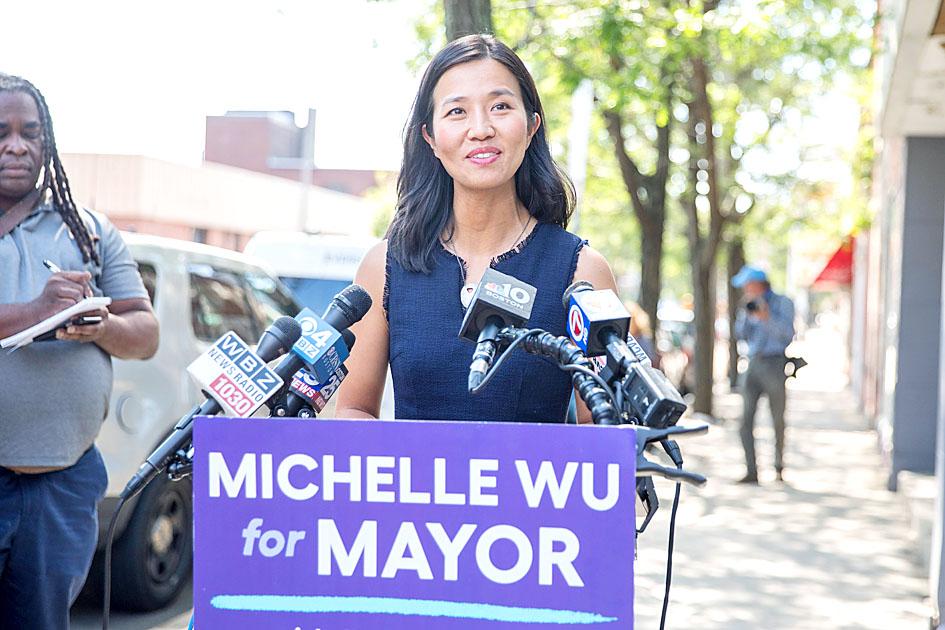Boston yesterday was on the cusp of narrowing its field of mayoral hopefuls for the first time to two people of color, possibly both women — a stark change from the unbroken string of white men elected mayor in the city’s first 200 years.
Voters yesterday cast ballots in a preliminary mayoral election that is to select two top contenders from a field of five main candidates, with Taiwanese-American Michelle Wu considered the favorite.
The two winners are to face off against each other on Nov. 2, ushering in a new era for a city that has wrestled with ethnic strife.

Photo: AFP
Boston Acting Mayor Kim Janey, city councilors Wu, Annissa Essaibi George and Andrea Campbell, and John Barros, the city’s former economic development chief, are all vying to be one of the top contenders.
Janey has already made history, becoming the first black Bostonian and first woman to occupy the city’s top office in an acting capacity after former Boston mayor Marty Walsh stepped down earlier this year to become US President Joe Biden’s labor secretary.
All of the candidates are Democrats. Mayoral races in Boston do not include party primaries.
The candidates hail from a range of backgrounds.
Wu’s parents immigrated to the US from Taiwan. Janey and Campbell are black. Essaibi George describes herself as a first generation Arab-Polish American. Barros is of Cape Verdean descent.
Wu has held a lead over the other top four candidates in a number of recent polls, setting up a scramble among the other contenders for the second spot if Wu’s lead holds.
Boston has changed radically since its down-at-the-heels days of the 1970s, when the city found itself in the national spotlight over the turmoil brought on by school desegregation, and of the late 1980s, when the case of Charles Stuart again inflamed simmering ethnic tensions.
The latest US census showed that residents who identified as white make up 44.6 percent of the population compared to black residents (19.1 percent), Latino residents (18.7 percent) and residents of Asian descent (11.2 percent).
The city has also changed politically.
In 2018, former Boston city councilor Ayanna Pressley defeated longtime US representative Michael Capuano to become the first black woman elected to the US Congress from Massachusetts.
The same year, Rachael Rollins, a former federal prosecutor, won an election to become Boston’s first female district attorney and the first woman of color to hold such a job anywhere in Massachusetts.
In July, she was nominated by Biden to become the state’s top federal prosecutor.
Among the challenges facing the city are those brought on by gentrification, which has forced out many long-term residents, including those in historically black neighborhoods.
Added to that are a host of other challenges that face the new mayor, from transportation woes, racial injustice and policing to schools and the ongoing response to the COVID-19 pandemic. One of the most pressing issues is the cost of housing, which is outpacing the financial means of many tenants and prospective homeowners.

STEPPING UP: Diminished US polar science presence mean opportunities for the UK and other countries, although China or Russia might also fill that gap, a researcher said The UK’s flagship polar research vessel is to head to Antarctica next week to help advance dozens of climate change-linked science projects, as Western nations spearhead studies there while the US withdraws. The RRS Sir David Attenborough, a state-of-the-art ship named after the renowned British naturalist, would aid research on everything from “hunting underwater tsunamis” to tracking glacier melt and whale populations. Operated by the British Antarctic Survey (BAS), the country’s polar research institute, the 15,000-tonne icebreaker — boasting a helipad, and various laboratories and gadgetry — is pivotal to the UK’s efforts to assess climate change’s impact there. “The saying goes

Floods on Sunday trapped people in vehicles and homes in Spain as torrential rain drenched the northeastern Catalonia region, a day after downpours unleashed travel chaos on the Mediterranean island of Ibiza. Local media shared videos of roaring torrents of brown water tearing through streets and submerging vehicles. National weather agency AEMET decreed the highest red alert in the province of Tarragona, warning of 180mm of rain in 12 hours in the Ebro River delta. Catalan fire service spokesman Oriol Corbella told reporters people had been caught by surprise, with people trapped “inside vehicles, in buildings, on ground floors.” Santa Barbara Mayor Josep Lluis

Police in China detained dozens of pastors of one of its largest underground churches over the weekend, a church spokesperson and relatives said, in the biggest crackdown on Christians since 2018. The detentions, which come amid renewed China-US tensions after Beijing dramatically expanded rare earth export controls last week, drew condemnation from US Secretary of State Marco Rubio, who on Sunday called for the immediate release of the pastors. Pastor Jin Mingri (金明日), founder of Zion Church, an unofficial “house church” not sanctioned by the Chinese government, was detained at his home in the southern city of Beihai on Friday evening, said

TICKING CLOCK: A path to a budget agreement was still possible, the president’s office said, as a debate on reversing an increase of the pension age carries on French President Emmanuel Macron yesterday was racing to find a new prime minister within a two-day deadline after the resignation of outgoing French Prime Minister Sebastien Lecornu tipped the country deeper into political crisis. The presidency late on Wednesday said that Macron would name a new prime minister within 48 hours, indicating that the appointment would come by this evening at the latest. Lecornu told French television in an interview that he expected a new prime minister to be named — rather than early legislative elections or Macron’s resignation — to resolve the crisis. The developments were the latest twists in three tumultuous